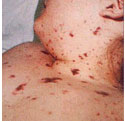Babies may get meningitis
booster
22 June, 2004
Young infants may get an extra
dose of meningitis C vaccine to boost their protection against the
potentially fatal disease. Some infants immunised when they were younger
than five months did not have long-term protection, the Health Protection
Agency has found.

It says government should consider changing the current immunisation
schedule.
The Department of Health said it was seeking further advice.
The UK introduced the meningitis C vaccination into the routine childhood
immunisation schedule in November 1999.
Alternative vaccination schedules must be seriously considered
The HPA researchers
This was because meningitis C had infected about 1,530 people and caused 150
deaths in 1998, mainly in children and young adults.
Under the schedule, a dose of the meningitis C vaccine was given to infants
at two, three and four months of age.
The vaccine was also offered to all children younger than 18 years in a
catch-up campaign designed to quash rates of infection.
infection.
In 2001, there was a 90% reduction in cases and deaths from meningitis C.
In 2002, the government extended the programme to include people younger
than 24.
Waning protection
Dr Mary Ramsay and colleagues at the HPA looked at surveillance data for the
last four years since the introduction of the vaccine programme.
The vaccine offered high levels of protection in the first year, regardless
of the age of the child at the time they were immunised.
Thereafter, the vaccine remained highly effective in children aged five
months to 18 years, protecting nearly 90% of those immunised.
But it's protection waned in children younger than five months.
Only two-thirds had immunity against meningitis C a year after they had been
vaccinated.
The researchers identified 53 vaccine failures overall, 21(40%) of which
were in children who had been routinely immunised as an infant.
The researchers said this rapid waning was worrying.
Despite this, they said few infants were catching meningitis, probably
because the rest of the society had been successfully immunised.
They said their findings reflected what was happening with immunity
conferred by the childhood Hib (haemophilus influenza type b) vaccine, which
is given at the same stages in infancy.
They believe the critical factor for both meningitis C and the Hib vaccines
is the age at which the final dose is given.
Change in policy
Dr Ramsay said: "Alternative vaccination schedules must be seriously
considered
"One way is to put a booster in at maybe the second year of life or later.
"The other way would be to change the schedule to spread it out over a
longer time.
"Maybe you could get away with two doses early in life and one later, say
two, four and six months or two, four and nine months for example."
She said they would study these options and continue to monitor immunity
levels in older children.
Dr George Kassianos, a GP in Berkshire and immunisation spokesman for the
Royal College of General Practitioners, said it was "extremely reasonable
and desirable" to suggest booster doses might be needed.
He said the best time to give children an extra dose would be when they
visited their GP for their MMR vaccine.
A spokeswoman from the Department of Health said: "It's a very interesting
study commission to look at the long term effects and we will now be
referring it to the Joint Committee on Vaccination and Immunisation and the
Committee on Safety of Medicines for further advice."